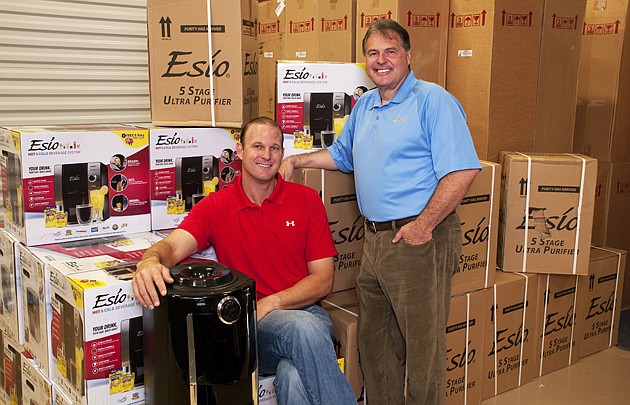- November 25, 2024
-
-
Loading

Loading

By most accounts, Chuck Vollmer should be in the pleasant twilight of a 40-year career in financial planning and money management.
Instead, Vollmer, 65, has just about started over.
His business now, instead of stocks and bonds, is beverage systems and water filtration. He runs the Sarasota franchise unit of Esio Beverage System, a Mesa, Ariz.-based company that offers what it calls the first hot and cold ready-to-drink beverage dispenser on the market. The Esio machine, essentially a water cooler with a twist, can make cold strawberry-lemonade one minute and hot coffee the next. It does that through a proprietary system and a series of pouches that can be inserted into the machine.
The franchise is one of two in the country; the other is in Connecticut. “I wanted something with magnitude and something I can embrace like a family business,” says Vollmer. “I wasn't looking for a haircut place.”
Vollmer, though, also sought to confront what he considers his career's darkest and most painful nightmare: Being at the helm of the Longboat Key branch of Stanford Financial Group in early 2009. That's when the Houston-based firm's founder, R. Allen Stanford, was charged with bilking the company and hundreds of clients in a $7 billion Ponzi scheme. Stanford and several other onetime Stanford Group executives were convicted of federal fraud charges in 2012. Stanford was sentenced to 110 years in prison.
Vollmer and his Longboat Key Stanford associates, who managed $600 million in assets, were never criminally charged in the case. Vollmer, however, did withdraw an application to work with another brokerage firm in a 2009 agreement with the Florida Office of Financial Regulation. That agreement, in which Vollmer didn't admit or deny allegations, stems from roughly $80 million in certificates of deposit the local Stanford office sold that authorities say were tied to Stanford's scheme.
Vollmer and a Stanford Group colleague and his stepson, Matt Drews, maintain they not only didn't know about Stanford's fraud, but they were victims, too. They decline to say how much of their own money they lost in the scheme, only to say it was significant.
After a six-month self-imposed business timeout, meanwhile, Vollmer reentered the world in 2010. “I had to get out and do something,” he says, “rather than sit around and wallow in pity.”
Vollmer met with franchise consultants and business brokers. He considered several other options before Esio, including an IT firm, a business consulting gig and even a disaster-recovery business. He chose Esio because he liked its recurring revenue strategy and he clicked with the firm's founder, Frank Leonesio, a 40-year franchise and small business veteran.
Drews, a former baseball player who was drafted by the New York Yankees in 1993 and worked briefly at Oppenheimer & Co. after Stanford, joined Vollmer at Esio. Their Esio franchise unit had 1,100 clients and 10 employees through December. Its sales approach is a combination of newtorking and cold calls. The franchise has hovered between breaking even, says Drews, and operating at a slight loss.
“This is still us digging our way out,” says Vollmer, who started working in money management in the region with an E.F. Hutton office in 1984. “This is a major transition.”
Yet Vollmer tries to remain optimistic, even in the face of future challenges and the past that haunts him. No matter where the business goes, adds Vollmer, he says he's content that he's in control.
“There have been times of difficulty here, and there have been times of joy,” says Vollmer. “But with all the headaches, there is a freedom here I enjoy.”